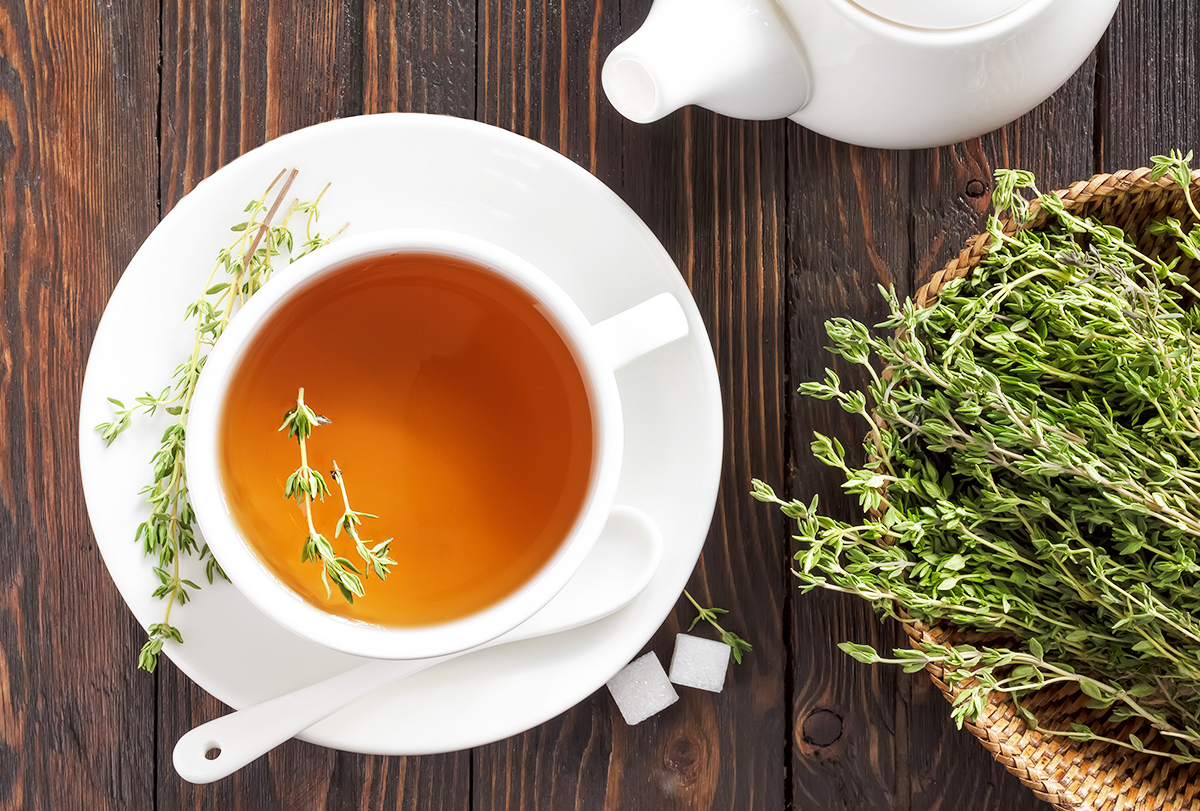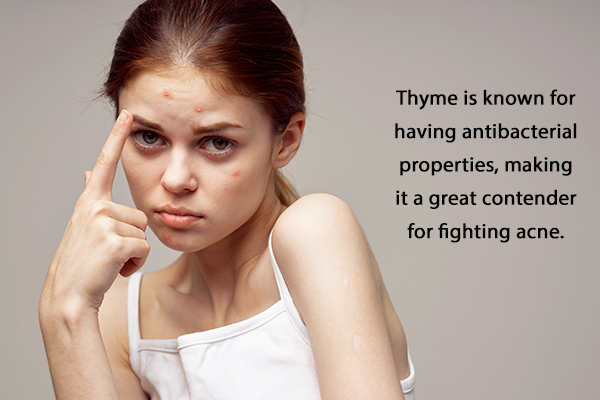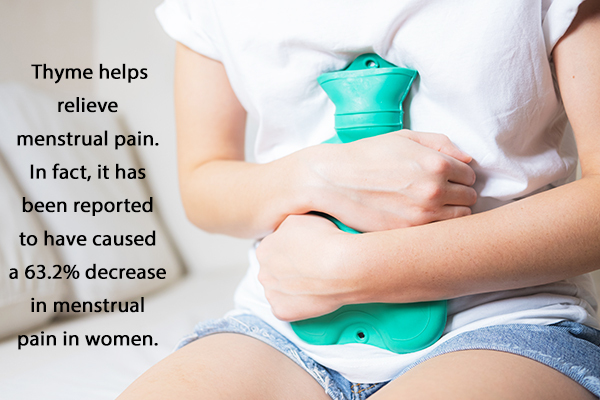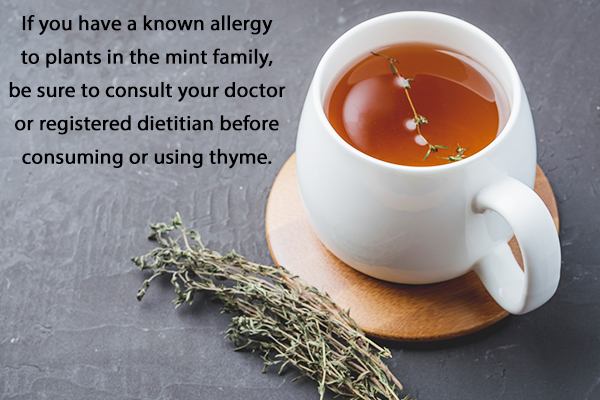In this article:
Thyme (Thymus vulgaris) is an herb in the mint family that originated in ancient societies throughout the Mediterranean region. (1) Today, thyme is grown all over the world and is used in numerous ways in cooking.

Not only does thyme add flavor to meals and teas, but it also contains various medicinal properties. This flavorful herb has anti-inflammatory, antimicrobial, and antioxidant properties that are beneficial to health. (2)
By consuming thyme, you can add flavor to your dishes and help improve your health at the same time.
Health Benefits of Thyme
Here are some reasons why you should include thyme in your diet:
1. Helps relieve coughing

Thyme has been used in herbal medicine and as a home remedy for cough, respiratory conditions, and bronchitis for years. (3)
According to a 2006 study, (4) thyme with a combination of ivy leaves proved to be helpful in treating symptoms of acute bronchitis, which included coughing. While research shows promising results, more recent human studies in this area are needed.
2. Reduces high blood pressure
Thyme may help bring down high blood pressure.
A 2013 study reported that supplementing Thyme vulgaris as an herbal remedy for 8 weeks significantly reduced blood pressure in rats. (5) This finding is encouraging because it provides a natural way to help treat hypertension.
In other animal studies, researchers found that taking thyme extract helped reduce risk factors for heart disease, which included blood pressure, total cholesterol, LDL “bad” cholesterol, and triglycerides. (6)
Although there is assuring evidence, research with human studies is limited. More research needs to be conducted to determine thyme’s efficacy in lowering blood pressure in humans.
3. Improves mood
Thyme in the form of essential oil may positively impact your mood. This is due to the active substance carvacrol in thyme.
A 2013 animal study found that the administration of carvacrol for 7 consecutive days was able to increase serotonin and dopamine levels. Both hormones are important in regulating your mood. (7) More research is needed to determine thyme’s ability to positively affect mood, but results are encouraging.
Consider using thyme in cooking or as an essential oil in aromatherapy to help boost your mood and feeling of well-being.
4. Aids in the treatment of acne and eczema

Thyme has been studied as an herb to help treat common skin conditions such as acne and eczema.
In a 2012 randomized, double-blind, placebo-controlled trial study in Ethiopia, researchers found that a 3% thyme essential oil antifungal cream was an effective intervention to treating mild to moderate cases of eczema-like lesions. (8)
Thyme is also known for having antibacterial properties, making it a great contender for fighting acne. According to a 2010 study, utilizing thyme in essential oil form showed antibacterial effects against P. acnes, (9) common bacteria that causes acne.
This evidence is promising, but further research needs to be done to determine thyme oil’s efficacy in treating acne and reducing pimples.
5. Protects against colon and breast cancers
Thyme has been tested as an herb to help prevent certain cancers. A 2012 study found that extracts from mastic thyme may have a protective effect against colon cancers. (10)
In another 2019 study, researchers found that thyme demonstrated anticancer activity, such as antioxidative or proapoptotic effects, in experimental breast cancer using two in vivo models. (11)
Thus, adding thyme to a balanced diet may help with cancer prevention.
6. Relieves menstrual pain

Thyme has the potential to help relieve menstrual pain in women. According to a study, 252 young Ethiopian students who drank thyme tea reported a decrease of 63.2% in menstrual pain. (12)
Further research needs to be conducted in this area, but drinking thyme tea may be a useful solution to ease menstrual pain.
7. Repels mosquitoes
To fight pesky mosquitos, try using thyme as a natural bug repellent. The oil in thyme, known as thymol, has been shown to help repel bugs such as mosquitos. (13)
Nutritional Content of Thyme
Thyme is a nutrient powerhouse with an abundance of health-promoting nutrients. It is a source of nutrients such as vitamin A, vitamin C, potassium, magnesium, and B complex vitamins. Thyme also contains manganese, zinc, calcium, and iron.
One-teaspoon serving of fresh thyme provides 0.8 calories, 0 grams of protein, 0 grams of fat, 0.2 grams of carbohydrates, and 0.1 grams of fiber.
It is important to note that while thyme provides these nutrients, it is not a substantial source of these nutrients unless consumed in large quantities. Hence, aim to meet most of your daily needs of nutrients by consuming a balanced diet with a variety of fruits, vegetables, legumes, whole grains, lean protein foods, and healthy fats.
Thyme also contains thymol, which has been used for centuries in herbal medicine. Thymol has been shown to contain medicinal properties including antioxidant, anti-inflammatory, analgesic, antispasmodic, antibacterial, antifungal, antiseptic, and antitumor effects. (14)
Nutritional value of thyme per 100 gms: (15)
| Nutrient | Amount |
|---|---|
| Energy | 276 kcal |
| Protein | 9.11 g |
| Total lipid (fat) | 7.43 g |
| Carbohydrate, by difference | 63.9 g |
| Fiber, total dietary | 37 g |
| Sugars, total including NLEA | 1.71 g |
| Calcium, Ca | 1890 mg |
| Iron, Fe | 124 mg |
| Magnesium, Mg | 220 mg |
| Phosphorus, P | 201 mg |
| Potassium, K | 814 mg |
| Sodium, Na | 55 mg |
| Zinc, Zn | 6.18 mg |
| Copper, Cu | 0.86 mg |
| Manganese, Mn | 7.87 mg |
| Selenium, Se | 4.6 µg |
| Vitamin C, total ascorbic acid | 50 mg |
| Thiamin | 0.513 mg |
| Riboflavin | 0.399 mg |
| Niacin | 4.94 mg |
| Vitamin B6 | 0.55 mg |
| Folate, total | 274 µg |
| Choline, total | 43.6 mg |
| Vitamin A, RAE | 190 µg |
| Vitamin A, IU | 3800 IU |
| Vitamin E (alpha-tocopherol) | 7.48 mg |
| Fatty acids, total saturated | 2.73 g |
How to Include Thyme in Your Diet
Thyme, whether fresh or dried, can be used in a variety of ways. Incorporate this nutritious herb into your diet by doing the following:
- Add dried or fresh thyme to chicken, beef, or vegetable stock.
- Reduce sodium in recipes by substituting half or all of salt with thyme.
- Make tea with infused thyme.
- Season chicken, fish, or your favorite protein source with thyme.
- Toss roasted vegetables or potatoes with thyme, olive oil, and garlic powder.
- Use thyme in soups or stews to enhance the flavor.
- Have a fun take on traditional pesto by using thyme instead of basil.
When Is Consuming Thyme Not Appropriate?

If you have a known allergy to plants in the mint family, be sure to consult your doctor or registered dietitian before consuming or using thyme.
For women who are pregnant or breastfeeding, eating thyme in fresh or dried form is safe in recommended amounts. However, there is not enough evidence to support consuming large amounts of thyme, especially in supplement or essential oil form.
To be safe, it is recommended to consume thyme in food form only and in proper servings.
If you are scheduled to have surgery, it is recommended to stop using thyme at least 2 weeks before surgery. This is due to thyme’s ability to potentially slow down blood clotting.
Slower blood clotting puts you at higher risk for excessive bleeding during and after surgery. Stay on the safe side and refrain from using thyme before any surgical procedure.
Precautions for Consuming Thyme
A serving of thyme is usually 2 tablespoons fresh thyme or 1 teaspoon dried thyme. Thyme is generally safe when used in cooking with normal amounts of the fresh or dried forms of the herb.
If you choose to ingest thyme in supplemental form, be aware that supplements typically contain higher amounts and may cause side effects.
For example, consuming too much thyme, especially in supplemental or essential oil form, can result in an abnormal drop in blood pressure known as hypotension. This is especially important for individuals who currently take high blood pressure medications or anticoagulants.
Always be sure to consult your primary care physician before using thyme supplements or essential oils to prevent any interactions or negative side effects.
Final Word
Incorporating thyme into your diet is a great way to add flavor to your dishes and gain many health benefits. The benefits include improved blood pressure, better mood, and potential protective properties against colon and breast cancer.
Thyme also has been shown to help relieve coughing, decrease menstrual pain, and aid in the treatment of skin conditions such as acne and eczema.
Furthermore, evidence shows that thyme can serve as a natural mosquito repellent. Thyme has many medicinal properties and can support a healthy lifestyle when incorporated into a balanced diet.
- Was this article helpful?
- YES, THANKS!NOT REALLY


